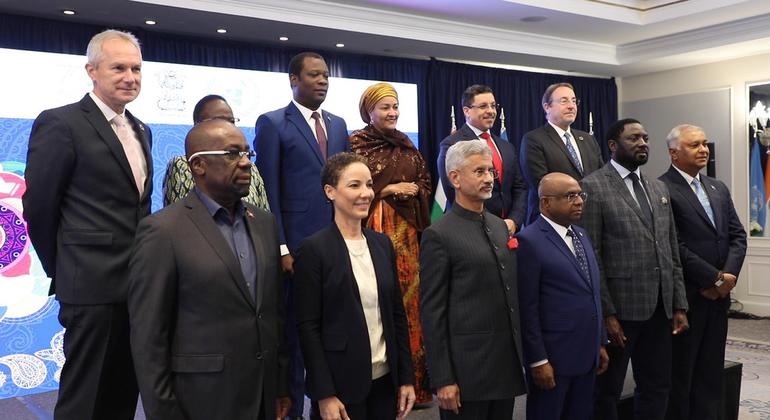
[ad_1]
UN Secretary-General Antonio Guterres’ message, read out by Deputy Secretary-General Amina J. Mohamed, said that and the World Organization trusts India to take credible measures to achieve the Sustainable Development Agenda 2030.
The Deputy Secretary-General welcomed India’s contribution to implementing the Sustainable Development Agenda, which includes the India-UN partnership.
He said in the message of the UN chief that as India is about to achieve the presidency of the G20, the United Nations is hopeful of India’s credible measures in the achievement of the goals related to the Addis Ababa Agreement and the Paris Climate Agreement.
The Deputy Secretary-General said in this message that India’s vast and growing potential in world transformation, the scale and pace of development, open the way for other countries to implement.
Changes in the food systems, sustainable energy, connectivity and health sectors will serve as opportunities to further strengthen partnerships.
sustainable development
He said that India has registered remarkable progress in equitable and sustainable development during the last 75 years.
India has also recorded extraordinary progress in the field of education, in which the number of universities at the time of independence was 20, which has now increased to more than a thousand.
The literacy rate has also increased from 18.3 percent in 1951 to 74 percent in 2011.
India has achieved the status of a self-sufficient country in food productivity, improving from the situation of food scarcity in the last 30 years.
During this, about 270 million people have been pulled out of extreme poverty, and India has become the fifth largest economy in the world. All sections of the society have been benefited by this.
India has also recorded extraordinary progress in the field of education, in which the number of universities at the time of independence was 20, which has now increased to more than a thousand.
The literacy rate has also increased from 18.3 percent in 1951 to 74 percent in 2011.
India has achieved the status of a self-sufficient country in food productivity, improving from the situation of food scarcity in the last 30 years.
And in the field of climate change, India currently has the potential to have the largest reserves of solar energy in the world.
Talking about the way forward, UN Deputy Secretary-General Amina J Mohamed said that India has the largest youth population in the world, which will play a decisive role in the success of the Sustainable Development Goals.
And as Prime Minister Narendra Modi has said, “The world changes when you reform.”
The program was attended by Dr S Jaishankar, External Affairs Minister of India, UN General Assembly President Kasaba Korosi, former President and Foreign Minister of Maldives Abdulla Shahid, United Nations Development Program – UNDP Its administrator Akhim Steiner and representatives of several allied countries of India expressed their views.
thousands of years of civilization
The President of the UN General Assembly, Kasaba Korosi, while congratulating the 75th anniversary of India’s independence (Diamond Jubilee), said that it is needless to mention that this civilization of several thousand years, gives so much to humanity, and inspires us even today. does.
“I commend the 1.3 billion Indian people for the progress they have made in just three generations,” he said.
“But I also appreciate his role in creating a better, brighter and more sustainable world.”
He said that about 1/6th of the entire humanity lives in India and the leadership of the country has been exceptional in raising the country’s strong voice on global challenges and multilateral matters.
successes and setbacks

United Nations Development Program (UNDP) Administrator Akhim Steiner said that India’s visit has also been full of many successes and sometimes some setbacks, but I think we should focus on extraordinary achievements.
For example, research shows that between 2005 and 2015, India had lifted about 21.70 million people out of poverty and this campaign is going on.
Between 1919 and 2021, per capita income in India has increased by 268 percent and life expectancy at birth has also increased by 8.6 years.
These are just numbers to say, but behind every number, millions of lives change, which are the result of choices and decisions of leaders, civil society, private sector, entrepreneurs in India.
The UNDP Administrator said that the United Nations, as a family, has been a part of this visit to India. India’s journey has also been remarkable in the Human Development Index and India’s commitment as a country to the 2030 Agenda and Sustainable Development Goals contributes not only to its own development but also to the development of others.

Shomby Sharp, the new Resident Coordinator (RCO) and Development Representative of the United Nations in India. (November 2021)
He said that as the United Nations Development Program (UNDP), we have been working with so many Indian institutions, government as well as partners in academia, civil society and the private sector, on solutions that not only help India not only benefit the citizens, but also benefit the citizens of the world.
Vasudeva Kutumbkam
The United Nations’ Resident Coordinator (RCO) in India, Schomby Sharp, said that India is home to about one-sixth of all humanity, has a steadily growing economy, has the world’s largest youth population, and is a country that is prone to multi-partyism and universalism. is a leading voice of development.
He said that this is a very important discussion. To put it in the words of the UN Secretary-General – in times of crisis, we need partnerships. And with 8 years left to achieve the Sustainable Development Goals, India continues to guide us.
With the vision of Vasudhaiva Kutumbakam, India has the potential to make a transformational change for Agenda 2030 on a global scale.
Not only has India been an important partner in shaping Agenda 2030, but we are also seeing increasing recognition of the Indian experience in the localization and realization of the Sustainable Development Goals.
We have also seen India’s solidarity with the COVAX facility and India’s contribution to the vaccination of many UN peacekeepers.
India has also emerged as a leader in climate action and climate justice.
[ad_2]
Source link





